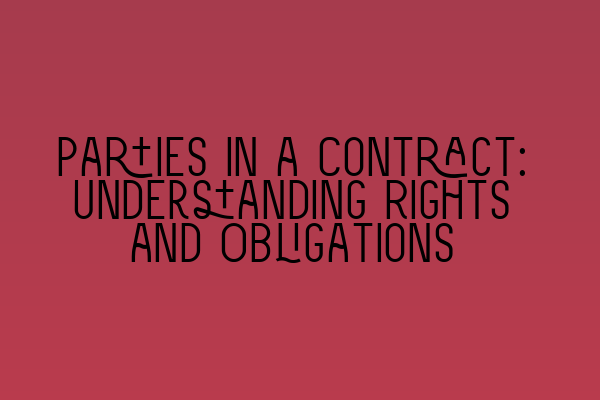Parties in a Contract: Understanding Rights and Obligations
In the world of contract law, parties play a crucial role. A contract is a legally binding agreement between two or more parties, wherein each party has certain rights and obligations. It is essential to understand these rights and obligations to navigate the complexities of contract law successfully. In this article, we will explore the parties in a contract, their roles, and the importance of comprehending their rights and obligations.
1. Introduction to Parties in a Contract
A contract typically involves two primary parties: the offeror and the offeree. The offeror is the party who makes an offer to enter into a contract, while the offeree is the party receiving the offer. Once the offer is accepted, both parties become bound by the terms and conditions outlined in the contract. It is vital for both parties to have a clear understanding of their rights and obligations to ensure a fair and equitable agreement.
2. Rights of the Parties
The rights of the parties in a contract are the benefits or entitlements they receive as a result of the agreement. These rights are often dependent on the specific terms and provisions stated in the contract. Common rights of the parties may include:
– Right to performance: Each party has the right to expect the other party to fulfill their obligations as outlined in the contract.
– Right to payment: If one party provides goods or services, they have the right to receive payment as per the agreed-upon terms.
– Right to remedies: In the event of a breach of contract, the injured party has the right to seek remedies such as specific performance or monetary compensation.
Understanding your rights as a party in a contract is essential to protect your interests and ensure that the agreement is upheld.
3. Obligations of the Parties
Alongside rights, parties in a contract also have obligations that they must fulfill. Obligations are the responsibilities or duties that each party must undertake to fulfill their side of the agreement. These obligations are typically outlined in the contract and may include:
– Obligation to perform: Each party is obligated to perform the tasks or obligations specified in the contract within the agreed-upon timeframe.
– Obligation to pay: If one party receives goods or services, they are obligated to make the agreed-upon payment within the specified timeframe.
– Obligation to provide information: Parties may have an obligation to provide accurate and timely information necessary for the performance of the contract.
Understanding your obligations as a party in a contract is crucial to avoid breaching the agreement and potential legal consequences.
4. Importance of Understanding Rights and Obligations
Having a clear understanding of the rights and obligations as a party in a contract is essential for several reasons:
– Legal protection: Understanding your rights and obligations helps protect you from potential legal disputes or disagreements that may arise during the course of the contract.
– Fulfilling the agreement: By understanding your obligations, you can ensure that you fulfill your side of the contract and prevent any breach of agreement.
– Negotiation power: Understanding your rights allows you to negotiate better terms if necessary and ensure a fair and equitable agreement.
By comprehending your rights and obligations, you can actively participate in the contract negotiation process and ensure a mutually beneficial relationship.
5. Conclusion
In conclusion, parties in a contract have specific rights and obligations that define their roles and responsibilities. Understanding these rights and obligations is crucial to navigating the complexities of contract law successfully. By comprehending your rights, you can protect your interests and seek appropriate remedies in the event of a breach. Simultaneously, understanding your obligations ensures that you fulfill your side of the agreement and maintain the integrity of the contract. For further information on related legal topics, feel free to explore the following articles:
– Navigating Legal Challenges and Pitfalls in Your Practice
– Barrister vs. Solicitor: A Comprehensive Comparison
– Understanding the SRA Competence Statement: A Guide for Solicitors
– Exploring Different Solicitor Specializations: Finding Your Niche
– Top Recommendations for Law Schools in the UK
Remember, a strong understanding of rights and obligations is crucial for a successful contract and can help you navigate the complexities of contract law with confidence.
